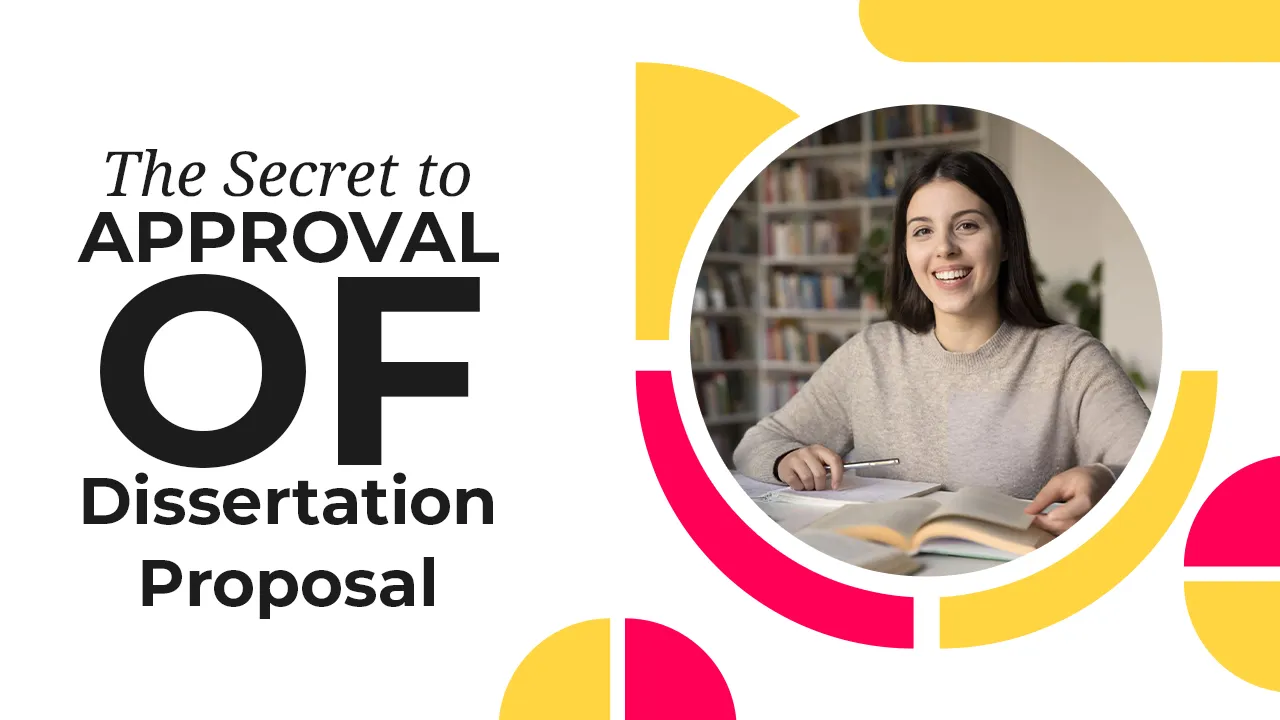Secrets to Getting Your Dissertation Proposal Approved Quickly

Contents
Introduction
Starting a PhD journey can be both exhilarating and daunting; getting your dissertation proposal accepted being one of its critical milestones. While this process might appear complex to some students, don't fret: here, we will guide you through this journey to help uncover its formula!
Understand the Importance of Your Proposal
At the core of every research endeavour lies your dissertation proposal - its contents provide a road map outlining goals, approaches and scope of investigation. Once approved by academic committee members, its significance indicates their belief in its benefits for furthering knowledge in certain fields.
Why, though, should an approved dissertation proposal be so crucial before embarking upon your dissertation research? Here are several reasons:

1. Establish Your Research
Your proposal forces you to critically appraise the relevance and applicability of your research question, helping refine ideas and define specifics about it ensuring an ideal beginning to your endeavours.
2. Provide Structure
A strong dissertation proposal serves as the cornerstone for your entire work, detailing each chapter and subtopic that comprise your findings presentation as well as any proposed changes that you intend to implement to maintain coherence throughout. Creating this structure ensures your dissertation stays focused while being organised for writing purposes.
3. Demonstrate Readines
Submitting your project for acceptance demonstrates to your committee that you are fully prepared to conduct independent research independently. Doing this demonstrates to them that you have carefully surveyed prior research literature, identified any gaps, and created a sound research strategy.
Get Your Dissertation Proposal Accepted
These tips will definitely help your dissertation proposal accepted by your professors.
1. Select the Appropriate Topic
Assume you want to write an academic proposal. Choose a subject which both meets the demands of academia, yet captures your passion as you consider its viability, significance, and contribution potential to academic fields of interest.
2. Write an Effective Research Question
At the core of every successful proposal is a clearly stated research question, which must be concise, targeted and achievable within your research parameters. Your question must also be unique to your area of expertise - should any difficulties arise, consulting an outside dissertation writer may help! If necessary.
3. Literature Review - Establishing a Solid Foundation
: Your proposal should contain an in-depth literature review which displays your understanding of the existing body of knowledge in your topic area and where your study fits within it. All relevant literature should be analysed, synthesised and evaluated so as to find any gaps or other flaws in its existing body of knowledge that may exist in its present state of knowledge.
4. Methodology is Important
: A comprehensive description of your research process should include how and why data will be gathered and examined, along with support of any proposed approaches that meet the research topic in mind.
5. Clear Objectives and Hypotheses
Aims and Hypotheses of your Investigation should Be Set out clearly (both goals and hypotheses provide evidence supporting your research question as a guide for investigation; ensure they are also clear, measurable, and achievable before beginning.
6. Ethical Considerations
Your research must address any ethical considerations which come up during its course; detail how you plan to protect participants' rights and privacy as part of an ethical study plan, in order to earn its committee's trust. In order to earn it successfully.
7. Timetable and Resources
Develop an accurate timetable and resource schedule for your research. Break your project down into manageable stages and plan the time allocation appropriately. Include any special equipment, access to archives or databases you might require as additional resources, plus any extra assistance such as hiring an dissertation writing service to keep on schedule if that becomes an issue for you.
8. Writing Style and Formatting
Pay close attention to how your writing is organised and written; adhere to any proposal guidelines provided by your school; proper formatting demonstrates professionalism in presentation of work.
9. Seek Guidance and Feedback
Don't be intimidated into asking your academic counsellor or mentors for assistance; they can offer invaluable assistance that could improve the effectiveness of your proposal. Also consider peer review to obtain multiple perspectives.
10. Presentation Skills
Be ready for a proposal presentation! Rehearse how you will articulate it clearly and confidently so as to leave an impactful impression with your committee. Your presentation's success depends heavily upon its assurance and clarity!
11. Respond to Feedback
Be ready for criticism when making proposals. Accept constructive advice before implementing necessary corrections based on any constructive criticism received, demonstrating your ability to alter and enhance the work. It shows a great sign that you possess such abilities!
Start your next chapter with us—click here to learn more. How Dissertation Proposal Writing Service Became Trending #1 on social media.

Frequently Ask Questions (FAQ's)
1. What Makes a Good Dissertation Proposal?
A strong dissertation proposal outlines a clear question that provides a comprehensive review of the literature. It also presents the defined methodology and shows the significance of the study that is being proposed. It should be structured accurately to showcase the expertise of the researcher in the study along with the potential contribution to the field.
2. What are the Main Steps of a Dissertation Proposal?
The main steps of a dissertation proposal are to involve defining a strong research question, doing a deep literature review, outlining the methodology, significance of the study, and planning. Every step needs careful consideration of all the possible academic standards.
3. What are the Elements of the Dissertation Proposal?
The elements of a dissertation proposal involve a clear research question along with a comprehensive literature review. There needs to be a defined methodology. A good dissertation proposal discusses the significance of the study. Each element of the proposal contributes to the feature of effectiveness in having good communication of the plan.
4. What is an Approved Dissertation?
An approved dissertation has to undergo evaluation which is being done by a committee. They check whether it meets the academic standards that are being set by the institution. It showcases the original research conducted by the student. Approval points that the dissertation has contributed to the knowledge in the field.
5. What Makes a Successful Dissertation?
A successful dissertation presents original research. It also has a clear research question. It is a practice that contributes new knowledge to the field of study. Success also has a lot to do with planning and execution. Ensure to have a thoughtful analysis of the process.

Conclusion
To summarise, careful planning, in-depth study and excellent communication are all needed to find success with having your dissertation proposal accepted. Remember that your proposal can change as comments or new details come in; so to enhance your academic career and win acceptance for it quickly learn its secrets - these allies in your effort have your back no matter the hurdles they present!
Your email address will not be published. Required fields are marked *
Recent Post

28 Jun 2024
The Benefits of Taking an Assignment
25 Aug 2025
Dangers of ChatGPT in University Essays
20% OFF!

Wow, what an insightful read! I must say this blog post brilliantly demystifies the journey of getting a dissertation proposal approved. Kudos to the author for sharing such valuable insights!
I just wanted to shout out this blog – super helpful stuff! Seriously, the tips on choosing the right topic and the importance of a solid literature review are game-changers. Thumbs up!
Greetings, I found this blog to be a comprehensive and invaluable resource for anyone navigating the journey of dissertation proposal approval. The meticulous attention to detail is truly commendable.
This blog got me thinking – how well do I really understand the existing body of knowledge in my topic area? The section on the literature review is a real eye-opener. Bravo!
I must say this blog hits the mark. Clear, concise, and loaded with practical advice. A must-read for anyone diving into the world of dissertation proposals.